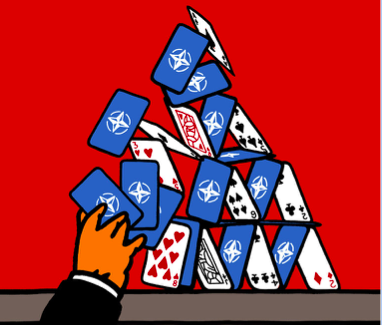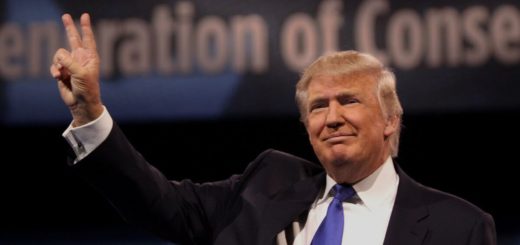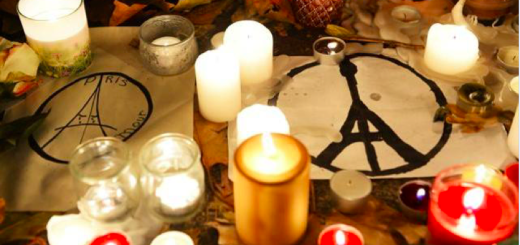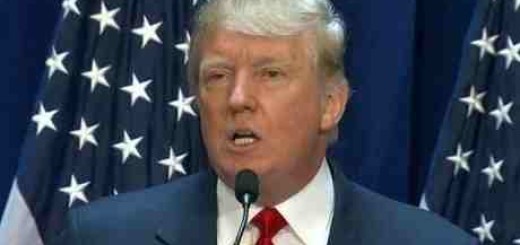Donald Trump’s Insult to History – New York Times (Editorial Board)

By THE EDITORIAL BOARD, New York Times, May 31, 2017 – Credit Pete Gamlen
 (Note: Is it not offensive and insulting to the great office of the most powerful country (US) in the world to say that its occupant (Donald Trump) is an “Insult to History?” Yet that is what that country’s own most reputed paper says of him. May be, it is an indication of the extent of the freedom of expression that country permits to its fourth estate. If so accept our salutes!
(Note: Is it not offensive and insulting to the great office of the most powerful country (US) in the world to say that its occupant (Donald Trump) is an “Insult to History?” Yet that is what that country’s own most reputed paper says of him. May be, it is an indication of the extent of the freedom of expression that country permits to its fourth estate. If so accept our salutes!
The Times editorial gives reasons for saying so, quoting another equally respected and powerful political figure in Europe, Chancellor Angela Merkel of Germany. In substance Merkel says that Trump has made US undependable and unreliable for the rest of the world, even for countries in Europe which has had very close and enduring business and cultural relationship ever since the second world war.
These two are powerful personalities for study in contrast and take lessons from. Trump reminds one of the notorious dictator “Hitler” about whom if any one had said “bad, bad, very bad” no one will get offended. But can anyone of common sense permit that of Angela Merkel and her Germany today and not get offended? Yet Trump used such words “bad, bad” about Germany, for the sake of Money, mammon of iniquity. (Read reports below on both Trump and Merkel.)
Chancellor Merkel instead was both forthright and polite and disagreeing with Trump and ‘Brexit’ without closing down the possibility of continued good neighborly cooperation and support for better international relations, peace and prosperity. Due to this cooperation democracy and free market flourished for the last 70 years. It is this precious achievement that Trump thoughtlessly flicks into history’s dustbin. A break up of trans-atlantic alliance would benefit only the dictatorial ambitions of a Putin of Russia. What the world needs today is not dictatorial domination but democratic service and preferential option for the poor and needy to wipe out hunger, disease and homelessness. That is what Merkel on the socio-political level and Pope Francis on the moral-spiritual level try to promote.
Today what is happening seems to be a potential seismic shift in trans-Atlantic relations leading to a break up to a united world order, all due to Trump’s thoughtless words and actions, as New York Times warns about. This is something those who earnestly dream of unity, cooperation, peace and prosperity in the human family, should think of seriously to avoid catastrophic consequences before things become too late to mend. Is that reason enough to label him as an “insult to history?” james kottoor, editor)
The tectonic plates of Europe are shifting, and President Trump is at the heart of this upheaval. Chancellor Angela Merkel of Germany bluntly made that point on Sunday when she said, “The times in which we could rely fully on others — they are somewhat over,” and the result is that “we Europeans must really take our fate into our own hands.”
With that line, it became clear that the United States is no longer the reliable partner her country and the rest of Europe have long depended on. Since World War II, the United States led the way in building a new international order rooted in NATO and the European Union as well as a belief in democracy and free markets. Britain, France and Germany were central to that effort, which for 70 years kept the peace and delivered prosperity to millions of people while standing firm against the Soviet threat, helping end the Bosnian War and combating extremism in Afghanistan.
This trans-Atlantic partnership is still vital. But how, and how well, it will function as American leadership recedes is unclear. So far, no one is talking about dissolving NATO; Europe still depends for its security on America’s nuclear and conventional arsenals. But Ms. Merkel’s remarks underscored profound divisions between Europe and the United States that have one clear beneficiary, President Vladimir Putin of Russia, who has longed for the alliance, Moscow’s Cold War adversary, to unravel.
Before Mr. Trump attended his first meetings of NATO and the Group of 7 last week, European leaders hoped they could bring him around on critical issues. That now seems like a pipe dream. Mr. Trump doubled-down on his most destructive campaign impulses by hectoring the other members at length for what he called their insufficient levels of military spending, and by refusing to reaffirm NATO’s bedrock mutual defense commitment. He also broke with the allies on other issues. He offered a more conciliatory line on Russia and refused, despite their entreaties, to endorse the Paris agreement on climate change.
When he returned home, Mr. Trump stoked the fires more, complaining in a tweet that Germany pays “far less than they should on NATO & military. Very bad for U.S. This will change.” His remarks showed no appreciation for how NATO works, how Ms. Merkel is in fact pushing her country to spend more on defense — and, more generally, how comments like this insult a trusted ally.
Europe’s dismay could only have deepened when Congress seemed to cheer Mr. Trump on. Republicans, who once prided themselves as stewards of national security, have shown little concern about the way Mr. Trump treated NATO members or the links between Mr. Trump’s aides and Russia. In a statement, Senator Bob Corker, chairman of the Senate Foreign Relations Committee, gushed over Mr. Trump’s trip to Europe and the Middle East, saying it was “executed to near perfection.”
These new stresses in the alliance come at a bad time. Europe has been battered by the Greek financial crisis; the rise of authoritarianism in Turkey, Hungary and Poland; Britain’s decision to withdraw from the European Union; and the flow of refugees from the Middle East and North Africa.
Meanwhile, Mr. Putin, always eager to expand Russian influence, has exploited every weakness and crisis, along with instigating a few of his own. Russia invaded Ukraine and has interfered in electoral campaigns in the United States, France and Germany. Mr. Putin has meddled in the Baltic States, cultivated far-right-wing allies in Hungary and wooed President Recep Tayyip Erdogan of Turkey on NATO’s eastern flank. He is now courting Italy with a savvy ambassador to Rome and financing for anti-establishment parties.
There are some bright spots. One is that Ms. Merkel seems committed to playing a lead role as the United States pulls back; another is France’s election of President Emmanuel Macron, who has demonstrated a willingness to work in partnership with Ms. Merkel. The two won’t always see eye-to-eye, but Germany needs France and Mr. Macron is a good fit.
Mr. Macron’s first foreign visit was to Berlin. And just days later, he has showed that he is not afraid of taking charge. After greeting Mr. Trump, Mr. Macron acknowledged deliberately keeping their handshake going to make a political point: I’m not your patsy. He made an equally strong point when he met in Versailles with Mr. Putin, who had probably worked to aid his rival, the far-right presidential candidate Marine Le Pen. Mr. Macron gave Mr. Putin full honors but did not mince words on Russia’s destructive role in the Syrian conflict, in Ukraine and in its dissemination of fake news. The message was one Europe should stick to in the future: No major issue can be resolved without talking to Russia, but differences with Moscow should not be swept under the rug.
For now, it looks as if it is up to Ms. Merkel and Mr. Macron to keep the alliance alive and relevant, at least until Mr. Trump wakes up to the need for American leadership or until another, wiser president replaces him.
Merkel, After Discordant G-7 Meeting, Is Looking Past Trump – By ALISON SMALE and STEVEN ERLANGER,MAY 28, 2017
Chancellor Angela Merkel of Germany in Munich on Sunday. “The times in which we could rely fully on others, they are somewhat over,” she said.CreditChristian Bruna/European Pressphoto Agency
BERLIN: Chancellor Angela Merkel of Germany, Europe’s most influential leader, has concluded, after three days of trans-Atlantic meetings, that the United States of President Trump is not the reliable partner her country and the Continent have automatically depended on in the past.
Clearly disappointed with Mr. Trump’s positions on NATO, Russia, climate change and trade, Ms. Merkel said in Munich on Sunday that traditional alliances were no longer as steadfast as they once were and that Europe should pay more attention to its own interests “and really take our fate into our own hands.”
“The times in which we could rely fully on others — they are somewhat over,” Ms. Merkel added, speaking on the campaign trail after a contentious NATO summit meeting in Brussels and a Group of 7 meeting in Italy. “This is what I experienced in the last few days.”
Ms. Merkel’s strong comments were a potentially seismic shift in trans-Atlantic relations. With the United States less willing to intervene overseas, Germany is becoming an increasingly dominant power in a partnership with France. The new French president, Emmanuel Macron, has shown a willingness to work with Germany and to help lead the bloc out of its troubles. And Ms. Merkel sees Germany’s future more and more with the European Union of 27 nations, without Britain after its vote to leave the bloc.
“This seems to be the end of an era, one in which the United States led and Europe followed,” said Ivo H. Daalder, a former United States envoy to NATO who is now the director of the Chicago Council on Global Affairs. “Today, the United States is heading into a direction on key issues that seems diametrically opposite of where Europe is heading. Merkel’s comments are an acknowledgment of that new reality.”
Ms. Merkel’s emphasis on the need of Europe to stand up for its own interests comes after Mr. Trump declined to publicly endorse NATO’s doctrine of collective defense or to agree to common European positions on global trade, dealing with Russian aggression or mitigating the effects of climate change.
“We have to know that we must fight for our future on our own, for our destiny as Europeans,” Ms. Merkel said.
Ms. Merkel, who did not mention Mr. Trump by name, also spoke of Britain’s decision to leave the European Union, which means the bloc will lose its second-largest economy and one of its two nuclear powers. Britain’s departure will also weaken trans-Atlantic ties and leave the Continent more exposed than before.
Given this new context for international relations, she said, “I can only say that we Europeans must really take our fate into our own hands — of course in friendship with the United States of America, in friendship with Great Britain and as good neighbors wherever that is possible also with other countries, even with Russia.”
With her statement, she seemed to be calling for German voters to get accustomed to a more active European role — and to more involvement by Berlin in crises on the Continent as well as global ones affecting Europe’s future. Ms. Merkel is seeking a fourth term as chancellor ahead of parliamentary elections in September.
Ms. Merkel was known to have been unsettled by her meetings with Mr. Trump in Washington in March, and she had been concerned that if Marine Le Pen won the French presidency this month, Germany would be isolated and the European Union badly damaged.
But Mr. Macron, who was meeting Mr. Trump for the first time, appeared to have a less negative impression of the outcome of the talks than Ms. Merkel. In a news conference at the end of the Group of 7 conference, Mr. Macron took a glass-half-full approach, saying that he believed, over all, that despite Mr. Trump’s earlier hostile language toward NATO, multilateralism was intact and there was a shared vision in a number of areas.
Mr. Trump campaigned on a platform of trade protectionism, nationalism and skepticism about multilateralism and climate change — all issues on which most European leaders disagree with him. Europeans also depend on NATO for their ultimate defense and are more concerned about an increasingly aggressive Russia than Mr. Trump seems to be, although his defense secretary and national security adviser, both senior military officers, insist that the president is fully behind NATO’s Article 5, which requires all members to come to the defense of any country in the alliance that is attacked.
Mr. Daalder said: “This is ‘America first’ — a policy focused on narrow self-interest — and abandons the idea that the best way to enhance our security and prosperity is by having strong allies and leading globally in pursuit of common values and interests.”
As they traveled back to the United States over the weekend, White House officials said Mr. Trump had succeeded in delivering a blunt message about self-reliance to American allies in Europe.They said the president’s decision to scold the NATO member countries about their contributions to the defense alliance would reduce the need for the United States to carry the financial burden for the Continent’s defense. And they said the president’s tough position on trade would help protect American companies from unfair practices.
On Saturday, Ms. Merkel was unusually direct in discussing what she called unsatisfying talks on climate change, which is an important issue for many German voters and a hallmark topic for the chancellor, who first made her mark in the 1990s shepherding an international accord on the environment. Ms. Merkel’s disappointment on the issue was not entirely shared by Mr. Macron, who said Mr. Trump had at least listened to the arguments of the other Group of 7 leaders.
Ms. Merkel, however, sounded a somewhat bleaker note. “The whole discussion about climate was very difficult, not to say unsatisfactory,” she said. “There’s a situation where it’s six, if you count the European Union, seven, against one.” “This is not just any old agreement, but it is a central agreement for shaping globalization,” she said. “There are no signs of whether the U.S. will stay in the Paris accords or not.”
Mr. Macron told the French news media that his now-famous handshake tussle with Mr. Trump was a deliberate effort to show that he could not be pushed around by the American president. He told the Sunday newspaper Journal du Dimanche that it was “a moment of truth” — designed to show that he is no pushover, and a message for the European Union leadership, as well. “My handshake with him — it wasn’t innocent,” Mr. Macron said. “One must show that you won’t make small concessions, even symbolic ones, but also not over-publicize things, either.”
The budding Merkel-Macron relationship is important, and Ms. Merkel has moved quickly to embrace him, conscious that he must still try to win a legislative majority in elections next month to be an effective partner. The European Union has traditionally been at its strongest when its two biggest continental powers work closely in tandem.
Accordingly, Ms. Merkel and her top aides held a bilateral meeting on Friday night in Sicily with Mr. Macron and his top officials, German officials said. Most strikingly, the spouses of the two leaders also attended. It is rare for Ms. Merkel’s husband, Joachim Sauer, to accompany her on trips abroad — something she said recently that he decides. Brigitte Macron is new to the role of France’s first lady, but Mr. Macron has credited her with giving him valuable political advice.
In general, Mr. Macron — who will meet with President Vladimir V. Putin of Russia on Monday at Versailles, outside Paris — has stressed friendship with Germany, appointing German speakers to critical positions, including prime minister, chief foreign policy adviser and defense minister. The newly elected president also kept the tradition of paying his first official visit to Berlin, doing so on his first full day in office.
As for Mr. Trump, he says the trip was a resounding success. On Sunday, after being restrained on Twitter while abroad, he returned to form, unleashing a barrage of posts. Among them: “Just returned from Europe. Trip was a great success for America. Hard work but big results!”
Mr. Daalder disagreed. “The president’s failure to endorse Article 5 in a speech at NATO headquarters, his continued lambasting of Germany and other allies on trade, his apparent decision to walk away from the Paris climate agreement — all suggest that the United States is less interested in leading globally than has been the case for the last 70 years,” he said. (Alison Smale reported from Berlin and Cologne, and Steven Erlanger from London. Alissa J. Rubin contributed reporting from Paris, and Michael D. Shear from Washington.)

















